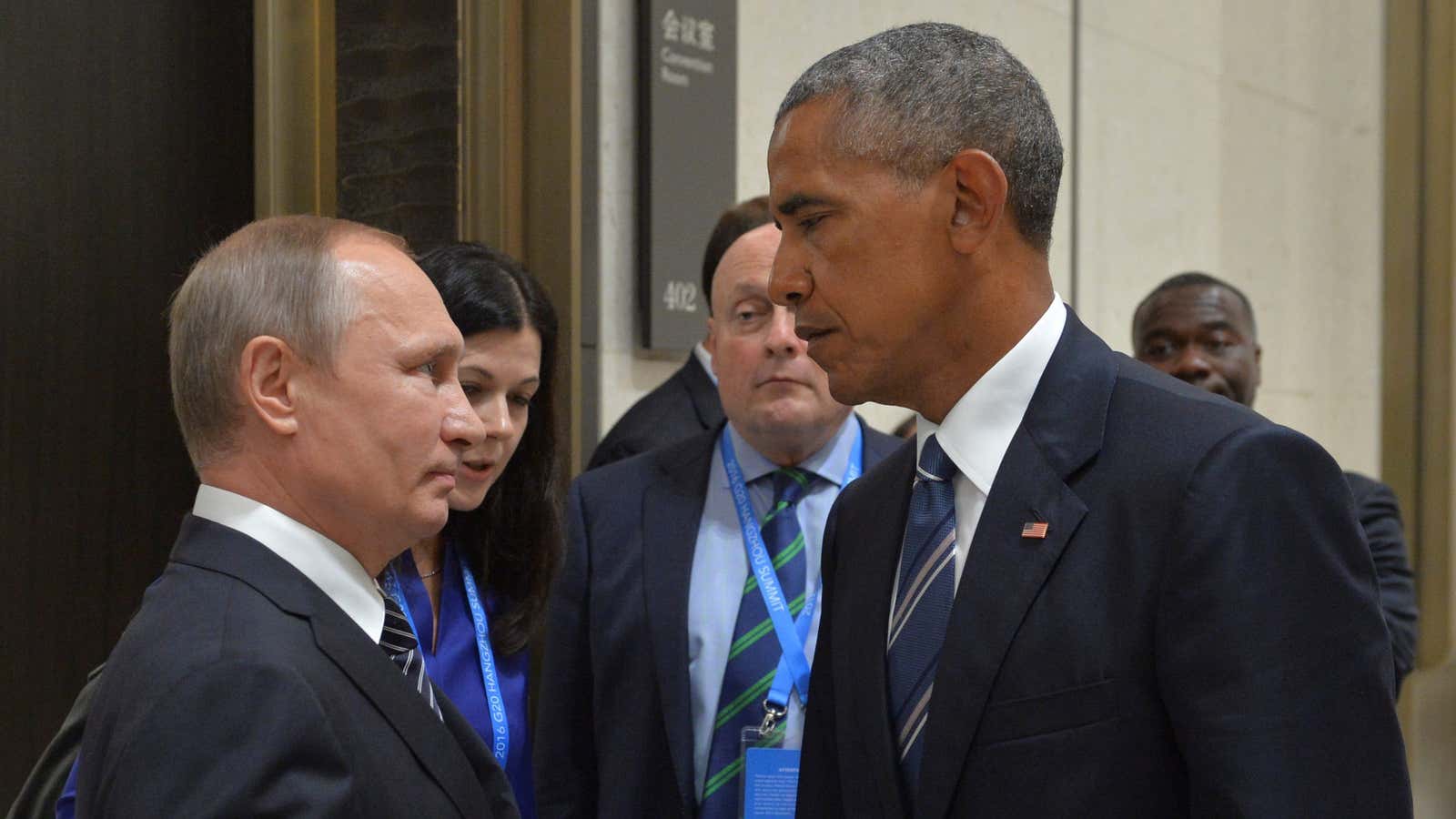Responding to evidence of Russian interference in America’s 2016 presidential election, the White House took retaliatory action on Dec. 29, booting 35 Russian diplomats from US soil, expanding sanctions, and publishing declassified technical information on “malicious cyber activity” by Russian civilian and military intelligence services.
No, this isn’t season five of The Americans—the US and Russia are pretty angry at each other right now, and it’s playing out just a month shy of US president-elect Donald Trump taking office. Here’s what you need to know:
What did the White House announce?
The Obama administration took a series of actions in retaliation against Russia. They include:
- Ejecting 35 Russian intelligence operatives from the Russian embassy in Washington and the Russian consulate in San Francisco. The individuals, declared “persona non grata,” have 72 hours to leave the US.
- Sanctioning two Russian intelligence agencies, four individual officers at one of those agencies, and three companies that provided material support to their cyber operations. The Department of Treasury also charged two Russians with “using cyber-enabled means to cause misappropriation of funds and personal identifying information.”
- Shutting down access to two sites, one in New York and one in Maryland, that US officials say were used by the Russians to collect intelligence. The Maryland property, on 45 acres along the state’s eastern shore, was purchased by the Soviet Union in 1972 and, according to Russian officials, has been used over the years “as a retreat for diplomats and their families,” the Baltimore Sun reported.
- Releasing a joint report—code-name “Grizzly Steppe”—from the US Department of Homeland Security and the Federal Bureau of Investigation, with detailed technical information on how Russian intelligence services conduct their activities. The specificity is intended to help cybersecurity firms identify Russian malware and combat the co-opting of computers around the world by Russian intelligence services.
What’s this all about again?
Some 17 US intelligence agencies have said that the Russian government was behind the hacking of emails from the Democratic National Committee, and meddling in the US election. “We believe, based on the scope and sensitivity of these efforts, that only Russia’s senior-most officials could have authorized these activities,” the DHS and the Office of the Director of National Intelligence on Election Security said in a joint statement in October.
What does Russia say?
Russian officials continue to deny claims that they interfered in the election; earlier this month, Russian foreign ministry secretary Sergey Lavrov called the allegations “nothing but nonsense.”
A Russian presidential spokesperson has vowed retaliation for the sanctions, saying that there would be “no alternative here to the principle of reciprocity.”
And the Russian embassy in London had this to say:
Is there precedent for this?
The US has issued sanctions against Russia before—over the conflict in Ukraine—but a foreign country known to be meddling in US elections is a first, and America’s infrastructure for responding to cyberthreats is still nascent. Also unprecedented: A US president-elect publicly disagreeing with the findings of multiple intelligence agencies.
Riiiight, what about Donald Trump?
The Obama administration and US intelligence agencies are pretty in sync on Russia’s involvement in the hacks; the president-elect not so much. Trump—who was accused throughout his campaign of being soft on Russia and its president, Vladmir Putin—has repeatedly said that he doesn’t believe the US intelligence agencies’ conclusions.
“I think we ought to get on with our lives,” Trump told reporters a day before the White House announced the retaliatory actions. “I think that computers have complicated lives very greatly. The whole age of computer has made it where nobody knows exactly what is going on.”
The sanctions put Trump in a tricky position. He’ll either have to accept them when he takes office, or lift them against the will of US intelligence agencies—and members of his own party. House speaker Paul Ryan, a Republican, called the sanctions “overdue” and top Republican senators Lindsey Graham and John McCain have also expressed support for the Obama administration’s actions.
“We intend to lead the effort in the new Congress to impose stronger sanctions on Russia,” Graham and McCain said in a joint statement.
